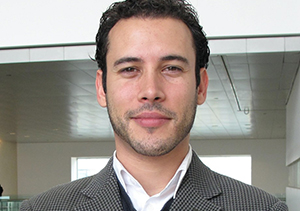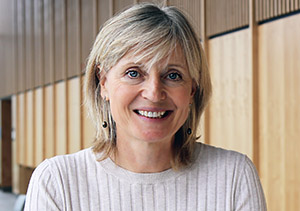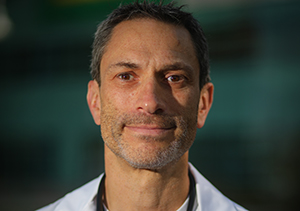Discoveries for life
The faces of health research 2021
| Title |
|---|

Identifying top priorities in paediatric care at hospitalsPartnering with children and families will help determine research gaps Dr. Peter Gill and Dr. Sanjay Mahant Hospital admission for paediatric care can be tough for both children and their families when the patients suffer from conditions like bronchiolitis or an underlying chronic disease. We launched the Canadian Paediatric Inpatient Research Network in collaboration with James Lind Alliance Priority Setting Partnership to engage Canadians in the identification 10 priority areas that matter most to them with regards to child healthcare. Their input will help us address areas such as special populations, communication, shared decision-making, support strategies, reduction of time in hospital, and support for Indigenous communities. This will, in turn, help us further pursue research in paediatric hospital care so that outcomes for young people, parents, caregivers, and healthcare professionals will improve overall. Further reading:
Twitter: @peterjgill, @Sanj_Mahant, @CanadaPIRN |


Systematic analysis of the molecular mechanisms of leukocyte entry into the pancreasSylvie Lesage (Canadian NPI) Lymphocytes, also known as white blood cells, defend the body against microbes, viruses, and cancer by circulating throughout the body. Aside from lymphoid tissues (spleen, lymph nodes, bone marrow, etc.), a small number of lymphocytes can be found in all other tissues, including the pancreas. The entry of lymphocytes into tissues such as the brain, the eyes, the muscles, or the pancreas, is regulated by specific proteins and processes. Aberrant or facilitated entry of lymphocytes into these non-lymphoid tissues can lead to severe immune pathologies. Notably, lymphocyte infiltrates in the pancreas have been documented in both type 1 and type 2 diabetes. Blocking immune cell entry in the pancreas would certainly provide therapeutic benefit to diabetes patients. Sylvie Lesage is a professor at the University of Montreal and is an expert in immunology and immunogenetics. She is the Canadian the Nominated Principal Investigator for a UK-Canada Diabetes Research team grant. Her team’s overall objective is to identify the proteins that allow both normal and aberrant lymphocyte infiltration in the pancreas. The UK-Canada team will use two complementary non-targeted approaches to identify key pathways facilitating lymphocyte entry into pancreatic tissue. First, by a novel molecular biology approach, namely ProCode, the UK team, led by Dr. Adrian Liston, will test the role of over 200 proteins in inhibiting or facilitating lymphocyte entry in the pancreas. Second, Dr. Lesage’s team will screen over 200 strains of mice from the Collaborative Cross and determine which of these mice present with more or less lymphocytes in the pancreas. As the genome of the Collaborative Cross mice is known, this unbiased approach will reveal genes that influence lymphocyte entry in the pancreas. Altogether, these complementary approaches will unravel the specific molecular pathways that need to be targeted to prevent lymphocyte entry in pancreatic tissue. Further reading:
Twitter: @LesageS_CRHMR, @UMontreal, @Fondationhmr |


Precision medicine in diabetes: Pharmacogenetic studies of large randomised controlled trials of diabetes therapiesMarie-Pierre Dubé (Canadian NPI) Diabetes is a chronic disease that affects how the body uses glucose and can lead to serious health problems, including cardiovascular disease, neuropathy, nephropathy, and eye disease. Type 2 diabetes is the most common type of diabetes, accounting for approximately 90% of all cases. Treatment of type 2 diabetes typically proceeds with the drug metformin, followed by a range of new combination therapy options. The latest treatment guidelines offer choices based upon risks, cost, and benefit, however there is considerable heterogeneity in who benefits and who is harmed from any of these treatments which are increasingly used in the UK and Canada. Marie-Pierre Dubé, professor at the University of Montreal, is an expert in genetic statistics, bioinformatics, and pharmacogenomics. She is the Nominated Principal Investigator for a UK-Canada Diabetes Research team grant. This UK-Canada collaboration brings together, for the first time, genetic data on randomised controlled trials of the newer diabetes medication, including SGLT2i trials (Dapagliflozin and Empagliflozin), GLP-1RA trials (Albiglutide, Lixisenatide), and DPP-4 inhibitor trials (Saxagliptin) in over 30,000 genetic samples. These unique resources when studied in combination, provide great power to identify genetic variants that alter benefit to these medications, side effects and cardiovascular outcomes. Here, Dubé’s team will conduct a series of genetic studies making use of dense genomic data. All subjects will be analyzed using leading-edge bioinformatics and statistical approaches. They aim to identify genetic variants that alter response and outcomes of those new diabetes drugs (SGLT2i, GLP-1RA, DPP-4i) with the goal to enable the personalization of therapy for diabetes, such that they can one day prescribe the best anti-diabetes therapy suited to each individual patient. Further reading:
Twitter: @MP_Dube, @UMontreal, @med_umontreal |

Xi-Care: eXplainable intelligent system for cardiovascular disease management among women in primary careDr. Samira Abbasgholizadeh-Rahimi Cardiovascular disease (CVD) is the leading cause of death among women in Canada, and can be five times more fatal than breast cancer. Yet, women tend to be diagnosed with CVD years later than men. While many people turn to primary care organizations to prevent and manage CVD, according to the The American Journal of Cardiology only 22% of primary care providers feel prepared to help women. Artificial intelligence (AI) could play an important role in supporting clinicians and patients, but it is rarely used. The objective of our Xi-Care project is to assess the different ways in which primary care providers and women would like to use AI for CVD prevention and management in primary care. Then, we will develop an AI solution that can predict the likelihood of women from having CVD in the future, and recommend personalized preventative strategies that will help them make informed and value-based decisions. We will pilot test Xi-Care among clinicians and women, and then continue to improve it. Further reading: Twitter: @RahimiSamira |

Cutting across mental health problemsUsing the Secret Agent Society to improve emotion regulation skills in kids who have problems with anxiety, depression, or anger Dr. Jonathan Weiss Children with neurodevelopmental disabilities (NDD), such as autism, attention deficit hyperactivity disorder, learning disabilities, or cerebral palsy, experience mental health problems that can make it difficult for them to manage their anger, anxiety, sadness, or stress. What if there was an intervention strategy that could help them? The Secret Agent Society (SAS) is a spy-themed cognitive behavioural intervention originally designed in Australia by the Social Skills Training Institute to improve the regulation of emotions and social skills among autistic children. We are investigating whether:
These studies will inform best practices in cognitive behaviour therapy for children with NDD by studying its use across symptoms, contexts, and modalities. It will also help us improve support for children who have NDD and their families. Further reading:
Twitter: @DrJonathanWeiss, @yorkuniversity |


The Right Timing to prevent Type 2 Diabetes: Restoring 24-hour substrate rhythmicity to improve glycemic control by timing of lifestyle factorsDr. André Carpentier (Canadian Nominated PI) Recently, our 24-hour culture has been identified as a factor that can contribute to the development of type 2 diabetes. Technological and societal advances such as electric lighting and digital screens, shift work, time zone transfers, and round-the-clock food availability disrupt intrinsic and evolutionarily preserved 24-hour rhythms resulting in a desynchronization between light cues and behaviour cues to our circadian system. This mistiming of cues is now thought to be a large contributor to the current metabolic health crisis. Preclinical data indicate that differentially timed interventions throughout the 24-hour cycle may have an impact on outcomes of these interventions. Dr. André Carpentier is an expert in diabetes, obesity, and cardiovascular complications. He is the Canadian Nominated Principal Investigator of the Dutch-Canadian research consortium entitled, The Right Timing to Prevent Type 2 Diabetes or “TIMED”. The objectives of the TIMED Consortium are to elucidate the mechanisms and the impact of differentially timed lifestyle interventions throughout the 24-hour period on type 2 diabetes to develop more effective interventions to prevent this disease. The consortium consists of experts in Canada and the Netherlands in integrative physiology, epidemiology, lifestyle interventions, patient engagement, and scientific networking. It will build on expertise in type 2 diabetes, patient engagement and lifestyle interventions and will utilize state-of-the-art methodological capacities, large longitudinal cohorts in Europe and Canada, and a large network of partners, to optimize lifestyle interventions for the prevention of type 2 diabetes, build training and mentoring capacity of the next generation of scientists, and develop a successful collaborative network engaging patients in research across Canada and the Netherlands. Further reading:
Twitter: @CarpentierAndr3, @USherbrooke andre+carpen |


Mobile Health Biometrics to Enhance Exercise and Physical Activity Adherence in T2DAli McManus (Canadian NPI) Being physically active and exercising is critical for the management of Type 2 diabetes. Exercise helps people with diabetes control their blood sugar and reduce other serious health risks associated with the condition, but many people with Type 2 diabetes find it hard to stick to an exercise program. Dr. Ali McManus, a UBC Okanagan Professor is the Canadian lead for the 14-person MOTIVATE-T2D team that is creating new ways that will help people living with Type 2 diabetes exercise regularly. Building on their existing partnership, the cross-disciplinary team are conducting the MOTIVATE-T2D clinical trial out of Kelowna, and Liverpool, UK. In MOTIVATE-T2D, participants are given cloud-connected heart rate monitors and receive individually-tailored counselling from an exercise specialist to help them start, and stick with exercise over a one-year period. The exercise specialist personalizes the exercise prescription and feedback to maximize health benefits. Given that the exercise is performed at home and the counselling delivered virtually, the team in Kelowna is recruiting participants from across Canada for this research study. The team believe that now more than ever, we need to meet the needs of individuals living with Type 2 diabetes by helping them manage their condition from home and are very excited that this evidence-based technology may help provide quality care from the comfort of people’s homes. Further reading:
Twitter: @alimacUBC, @MotivateT2D, @UBC_HES, @ubcokanagan |


Generation of a functionally robust stem cell-based therapy for type 1 diabetesDr. Francis Lynn A cure for type 1 diabetes (T1D) may lie in the replacement of insulin-producing cells by transplantation. Hundreds of patients worldwide (including ~400 in Canada) have received transplants of islets—clusters of insulin-producing cells in the pancreas—enabling better blood glucose control without the need for insulin administration. Yet because there are not enough organ donors, new sources of insulin-producing cells are needed for the millions living with this disease. We can now generate insulin-producing cells from stem cells, but these cells do not secrete insulin properly nor do they survive transplantation without immunosuppression. Dr. Francis Lynn is an Associate Professor at the University of British Columbia and is the Nominated Principal Investigator on a team grant funded by CIHR and JDRF Canada in Stem Cell-Based Therapies for the Treatment of Type 1 Diabetes. His team aims to use their combined expertise in single cell technologies, genome editing, immunology, and stem cell and islet biology to produce a new and improved cell source for cell replacement therapy in T1D that can be tested in clinical trial in a few years. Such an advance could not only transform the lives of thousands of Canadians living with T1D, but also greatly reduce the tremendous economic and health burden that diabetes places on Canada today. Further reading:
Twitter: @nictitate, @beta_cell, @BCCHresearch, @BCChildrenHosp, @UBC, @UBCmedicine |

How are Canadian public health agencies addressing COVID-19 through social media?It is important to develop a stronger community of practice that includes community leaders and researchers Dr. Anita Kothari Over the past year, our research team has been exploring how organizations use social media as a way to relay public health messages, address misinformation, and increase acceptance of COVID-19 vaccines across Canada. We have built our own machine learning model to assess sentiment of Canadian public health officials through their tweets, and tracked public reactions to social media communications through government accounts. This work complements our content analysis of tweets related to COVID-19 We have also spoken to 40 community health leaders from nonprofit groups, patient advocacy groups, and community health centers who have asked for support in communicating public health restrictions. We explored ways that they can tailor their communications strategies for equity-deserving groups. This work is raising another question though: How might we emerge from this pandemic as a more connected and resilient public health ecosystem? Over the course of the summer, our research team will continue to communicate with researchers and organizations, and encourage them to join our monthly knowledge exchange and networking sessions. Further reading: Twitter: @anitarena |

Helping parents support kids during COVID-19 pandemicEvaluating the efficacy of an online family intervention (I-InTERACT-North) Dr. Tricia Williams COVID-19’s unprecedented quarantine policies have increased stress among Canadian families. Those who have children who suffer from pre-existing neurodevelopmental difficulties (e.g., ADHD, autism) could experience enormous strain due to disruptions to their routines and decreased support. Providing opportunities for mental health support to these families is essential, with options that are flexible and matched to the family’s needs. I-InTERACT-North is already an active SickKids parenting program that has a strong record of success in providing virtual service delivery to families. This current study is evaluating whether a ‘stepped care’ approach of virtual mental health parent intervention can best treat the intensity of families’ needs during COVID-19. We have partnered with the Province of Ontario Neurodevelopmental Disorders (POND) Network to offer the program to children (ages 3-9) and their families in four Ontario centres (Holland Bloorview Kids Rehabilitation Hospital, SickKids, University of Western Ontario, and Queen’s University). Overall, our work will evaluate matching mental health care to family needs so that further mental health and family difficulties can be avoided, and help us foster the program’s growth beyond immediate crises. Further reading: Twitter: @WilliamsTS_Dr |

Probiotics not as beneficial as they are touted to beResearch into the use of a probiotic in children with acute gastroenteritis finds no associated benefits Dr. Stephen Freedman MDCM, MSc Probiotics administration in children with acute gastroenteritis has been a controversial topic for nearly two decades. Although the evidence to support use has been limited and often contradictory, bolstered by strong marketing campaigns from industry, usage has increased significantly. With the support of CIHR, Dr. Freedman’s team has conducted landmark studies assessing both the clinical benefits and potential mechanisms of action associated with the administration of a Lactobacillus rhamnosus/Lactobacillus helveticus combination product to Canadian children with acute gastroenteritis. In an evaluation of 886 children who presented to one of six participating emergency department with gastroenteritis, they found that twice-daily administration of the probiotic did not prevent the development of moderate-to-severe gastroenteritis within 14 days after enrollment (NEJM 2018). This was followed by a sub-study that explored whether there were virus-specific benefits in terms of reducing clinical symptoms or viral nucleic acid clearance from stool specimens collected up to 28 days following enrollment. This study yielded similar findings – that there were no benefits, either clinical or microbiologic associated with the use of the probiotic product evaluated in children with acute gastroenteritis (Nature Communications 2020). Recently the team further analyzed stool specimens collected as part of this study and found no effect of the probiotic preparation, relative to placebo on stool secretory immunoglobulin A concentrations (American Journal of Clinical Nutrition 2021). Taken together, these findings highlight the need for a re-evaluation of probiotic use in children with acute gastroenteritis and until future research provides a convincing evidence of benefit, probiotics should not be provided to children with acute gastroenteritis. Further reading:
Twitter: @UofCr4kids, @UCalgaryMed, @pert_calgary, @PERC_Network |


Using novel transplantation strategies and HLA-edited hypoimmunogenic hPSCs to develop a superior islet-like product for T1D treatmentDr. Maria Cristina Nostro Type 1 diabetes (T1D) is an autoimmune disease characterized by destruction of beta cells. Using islet transplantation, one can achieve restoration of glycemia in approximately 60% of T1D patients, indicating that cell replacement therapy is a viable option to treat this disease. However, donor scarcity, poor islet survival after transplant, the need to optimize the transplant site and the requirement for systemic immunosuppression limit this therapeutic application to only a few patients. Dr. Maria Cristina Nostro, Senior Scientist, McEwen Stem Cell Institute at University Health Network and University of Toronto, is the Nominated Principal Investigator of a recently funded team grant in Stem Cell-Based Therapies for the Treatment of Type 1 Diabetes, and an expert in regenerative biology. Her team, funded by CIHR and JDRF Canada, has expertise in stem cell biology, vascular biology, islet transplantation and beta cell biology and will focus on addressing all these challenges to develop a safe and effective clinical-grade product for therapy. This will be achieved by 1) using human stem cells to generate an unlimited source of surrogate islets, 2) enhancing islet survival by implementing novel transplantation approaches to optimize the transplant site, and 3) eliminating or reducing the need for immune-suppression by using a universal donor stem cell line that is designed to avoid rejection after transplantation. The outcome from these studies will accelerate the clinical translation of universal donor stem cell derived islet cells for T1D therapy. Further reading:
Twitter : @mcnostro, @UofT, @McEwenInstitute, @UHN |


Bridging the gap to translation by understanding and preventing diabetic vascular complications using human organoid cultureJosef Penninger (Canadian NPI) Diabetes affects nearly 3 million Canadians and 8.8% of the global population. In Canada, treating new cases of diabetes diagnosed between 2012-22 is estimated to cost $15.4 billion, while in the U.K., 10% of the NHS budget is spent on treating diabetes and associated complications, including kidney disease, blindness, heart attacks, stroke and amputation of lower limbs. These complications are often caused by changes in blood vessels; therefore, strategies that protect or repair blood vessels may be promising new treatments. Studies using mice and cultured cells have identified several molecules that protect blood vessels but moving these findings from laboratories to humans has been difficult. Dr. Josef Penninger’s group recently developed a novel method to create human blood vessels from stem cells in the laboratory. When exposed to diabetic conditions, these artificial blood vessels show the same changes and features seen in the blood vessels of diabetic patients. These artificial blood vessels will allow scientists to examine promising findings from mice and cells in a human-like environment before conducting clinical trials with human patients. Josef Penninger is a Canada 150 Chair in Functional Genetics and Director of the Life Sciences Institute at the University of British Columbia. Dr. Penninger, is an expert in immunology, cell and developmental biology, neuroscience, and diabetes. He is the Nominated Principal Investigator for a UK-Canada Diabetes Research team grant. Dr. Penninger will work with a team of U.K. based scientists, Drs. David Long, Luigi Gnudi, and Karen Price, to assess the potential of two previously identified molecules angiopoietin-2 and apelin to reverse changes caused by high blood sugar in artificial human blood vessels. Additionally, they will examine why some diabetic patients do not develop blood vessel-related complications. Their findings will ultimately lead to the discovery of new treatments for blood vessel complications in diabetes. Further reading:
Twitter : @penningerlab, @UBC, @ubclifesciences |


Remission of diabetes and improved diastolic function by combining structured exercise with meal replacement and food reintroduction (RESET)Kaberi Dasgupta (Canadian NPI) Kaberi Dasgupta is Full Professor of Medicine at McGill University and Director and Physician Scientist of the Centre for Outcomes Research and Evaluation at the Research Institute of the McGill University Health Centre. She is the Nominated Principal Investigator of a UK-Canada Diabetes Research team grant and is an expert in the prevention and management of diabetes and its related complications. RESET is a randomized controlled trial that adds a structured supervised exercise strategy to a low energy, partial meal replacement diet to tackle diabetes remission in people less than 40 years of age with type 2 diabetes mellitus (T2DM). Additionally, through the exercise component, it aims to offset lean mass loss, enhance fitness, and improve MRI based measures of diastolic function, which are early indicators of heart disease in T2DM. The ‘special ingredient’ is supervision and relapse management. The seminal DiRECT trial demonstrated that a low energy diet could remit T2DM, but to be sustained, active supervision needs to be reinstituted with weight regain. In RESET, this supervision will be reinstituted not only for dietary issues, but also for exercise. Participants in RESET will be randomized to either usual care or a 24-week low energy diet and a supervised exercise program. Following the 24-week period and outcome assessment, the control arm will be offered the low energy diet approach in appreciation of participation. The trial will be concurrently conducted in Montreal through the Research Institute of the McGill University Health Centre, the University of Alberta, and the Leicester Diabetes Centre. 100 participants will be recruited across these sites. By gathering outcomes and patient perspectives through this efficacy trial, Dr. Dasgupta’s team are working to improve the lives of people with T2DM, breaking barriers to the complications of this complex disease. Further reading:
Twitter : @cusm_muhc, @mcgillu, @McGillMed |
- Date modified:
